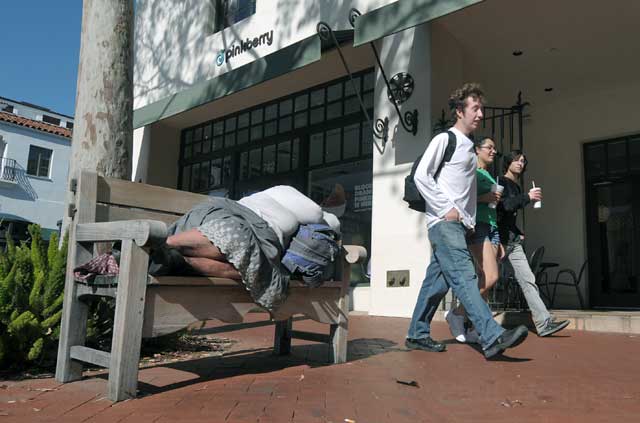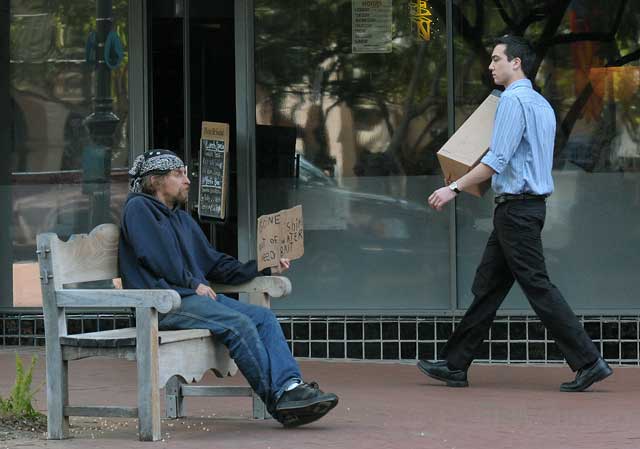Bench Relocation Put on Back Burner
Council Votes to Shelve the Divisive $50,000 Project

Santa Barbara City Councilmembers were all in agreement Tuesday that panhandling downtown is a problem. Their consensus split, however, when it came to the prospect of spending $50,000 in Redevelopment Agency (RDA) funds on a project that would reorient 14 State Street benches so homeless people would find them less desirable perches to beg and camp on. In an oddly divided 4-3 vote, the City Council opted to hold off on implementing the project for a year — possibly reworking it then — and will wait until the next budget cycle to decide if shuffling the seating would make shoppers feel more welcome and allow the public at large, not “just a select few,” to take advantage of the downtown amenities.
The project — hatched in partnership with the Downtown Organization — was brought before the council this week by Mayor Helene Schneider and Councilmember Bendy White. They were concerned about the proposal’s hefty price tag and lack of data to show that the strategy of rotating and moving benches on the 800 and 900 blocks of the city’s main thoroughfare would actually discourage panhandling. “The more I learned about what we were trying to do, the more questions I had,” said Schneider. “The intent is a good one, but I’m not sure this is the right method to get there.” City Hall had previously approved this year’s RDA’s budget — including the $50,000 slated for the relocation project — but started to receive mountains of critical feedback from residents after the proposal’s details were made public last month.
RDA project manager Marck Aguilar walked councilmembers through the project’s expense breakdown. Just mobilizing a crew, he said, would mean spending $5,000, and each bench would cost an estimated $1,250 to move. Relocating newspaper racks or trash cans (also part of the proposal) would cost a similar amount, and shifting a bike post would cost $725, explained Aguilar. Around 80 percent, or $33,325, of the project’s total cost would go toward construction alone. The rest would be spent in design services, city engineering services, and administrative fees. Arcadia Studios, which came up with State Street’s current brick-walked iteration — a layout that is meant to be flexible and subject to change — was selected as the project’s design consultant. Aguilar admitted the whole idea wasn’t thoroughly vetted before it began to move forward. “There wasn’t a lot of professional, in-depth analysis, because it didn’t seem warranted,” he said. To completely remove the benches, said Aguilar, would cost $3,500. Bill Collyer, head of the Downtown Organization, said he hasn’t yet spoken with a merchant who doesn’t have a bench in front of his or her store but would like one. Many, he explained, want them completely gone, with the spaces in front of Rite Aid and Café Zoma singled out as “problem areas.”

Schneider argued that the $50,000 might be better spent implementing parts of the council’s 12-point plan to end homelessness. She stressed ratcheting up efforts to integrate the Real Change Not Spare Change program, which was launched last year and encourages would-be Good Samaritans to drop money in designated bins, rather than giving directly to homeless, so that the cash can be funneled to outreach and recovery services. Downtown Organization reps said they were ready to get going with the Real Change program, but were just waiting for direction from the city. The mayor and other councilmembers also spoke nostalgically about the past deployment of a police officer just to deal with the downtown homeless. That strategy, though heralded as overwhelmingly effective in deterring panhandlers, became fiscally impossible when the Downtown Organization eliminated its matching funds. Now, however, the city’s finance department is looking at possibly using RDA monies to again pay for an increased police presence for that singular purpose.
Councilmembers Frank Hotchkiss and Michael Self — in tandem with Schneider and White — voted in favor of delaying the bench relocation project. Hotchikiss and Self argued it would be too much money to spend in these cash-strapped times and worried the move is simply a gamble considering a lack of data to suggest it would work. They also recommended that city staff work with an outside consulting firm to design socially engineered seating that would subtly encourage lingerers to move on.
Councilmembers Dale Francisco, Randy Rowse, and Grant House, on the other hand, thought the proposal should move ahead as-is. House, himself a downtown merchant, said he worried benches would eventually be completely removed if they weren’t shifted now, and called relocation a “gentle approach” that was agreed upon by shop owners and staff. He also said that $50,000, in the scheme of things, was not a deal-breaking sum, noting that the amount spread over the last decade during which State Street has been renovated and reworked is not especially significant. Aguilar said in his presentation that around $7 million has been spent on State Street over the last 10 or so years.
Francisco said similarly that “everything we do in the public space is astonishingly expensive” and argued that although the bench relocation project would likely not end panhandling (or even make a significant difference, he admitted), it speaks to an overall sound strategy of curbing downtown homeless activity. Francisco used the opportunity to reiterate the stance he took during city budget deliberations last week, that shifting city resources in order to increase police presence should be a top priority.



